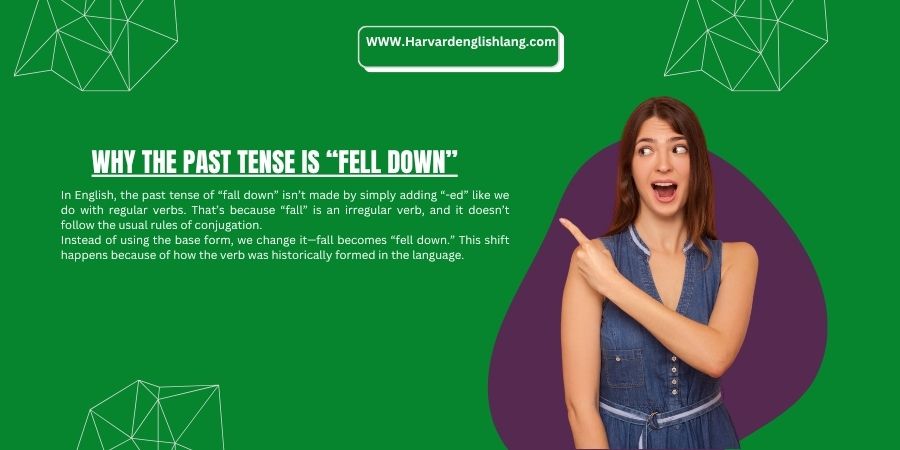I’ve often wondered during everyday conversations or while doing some casual writing—what exactly is the past tense of the phrase “fall down”? It sounds like such a common thing, yet the answer can make you pause. In this article, we’ll dive into this little language mystery.
My students used to ask this question all the time, and over the years, I’ve learned how to explore it in a way that feels clear, simple, and engaging. Think of this as your quick guide, a grammar breeze, with easy examples to help you feel confident next time it pops up.
What’s the past tense of “fall down”?
In my years of teaching English, one of the most common questions students ask is how to correctly describe the action when someone fell down. It might seem straightforward, but understanding the usage of the past tense form can really help you sound natural.
So, when they talk about something that happened yesterday, like a person who might have fall down the stairs, the right phrase is “fell down.”
It shows the motion of descending to a lower position, and it’s the proper way to refer to this action in the past. Getting this small detail right builds confidence and fluency.
You Might Also like: Axes or Axen? What’s the Plural of Axe?
Why the past tense is “fell down”

In English, the past tense of “fall down” isn’t made by simply adding “-ed” like we do with regular verbs. That’s because “fall” is an irregular verb, and it doesn’t follow the usual rules of conjugation.
Instead of using the base form, we change it—fall becomes “fell down.” This shift happens because of how the verb was historically formed in the language.
The pattern for irregular verbs often involves changing the word itself, and in this case, “fall” and “down” are combined to show a specific action.
As someone who’s studied and taught grammar for years, I’ve seen learners struggle with understanding the meaning behind these changes, but once you know the system, it makes much more sense.
What does the phrase “fall down” mean?
The phrase “fall down” or “falling down” describes the action of a person or object suddenly dropping or descending from a higher to a lower position, often unintentionally.
This kind of movement usually happens when someone loses their balance, and the body moves downward until it hits the ground. It could be due to gravity, or an external force like being pushed.
For example, a book may slide off a table and drop—that’s falling down in action. As someone who’s taught language in real settings, I’ve seen how this concept helps learners link real-world motion with grammar structures.
You Might Also like: What’s the Past Tense of Panic? Is it Panic or Panicked?
A Simple Tense Table
| Tense | Example |
| Present Simple | I walk to school. |
| Past Simple | I walked to school. |
| Future Simple | I will walk to school. |
| Present Continuous | I am walking to school. |
| Past Continuous | I was walking to school. |
| Future Continuous | I will be walking soon. |
Using “fall down” and “fell down” in sentences
Sentences using “Fall Down” (Present):
- I fall down whenever the floor is slippery.
- They often fall down while learning to skate.
- Be careful or you might fall down the stairs.
- Kids sometimes fall down when they run too fast.
- Objects without support easily fall down.
Sentences using “Fell Down” (Past):
- She fell down while running in the park.
- The book fell down from the top shelf.
- He fell down after slipping on the wet floor.
- They fell down during the hiking trip.
- I fell down the stairs yesterday but didn’t get hurt.
You Might Also like: How Are You Fairing or Faring? Uncover the Truth
Synonyms of “fall down” and “fell down”
Synonyms for “Fall Down”:
Physical Action:
- Tumble
- Trip
- Collapse
- Topple
- Slip
- Stumble
- Plunge
- Drop
- Keel over
Figurative or Structural Use:
- Break down
- Cave in
- Give way
- Crumble
- Fail
Synonyms for “Fell Down” (Past Tense):
For People (Physical Fall):
- Tumbled
- Tripped
- Slipped
- Stumbled
- Collapsed
- Dropped
- Toppled
- Plunged
- Kept over
For Objects/Structures:
- Caved in
- Crumpled
- Gave way
- Broke down
- Collapsed
Origin of the phrase “fall down”

The phrase “fall down” originates from Old English, where the word “fallan” meant to drop or descend. Over time, this ancient term evolved into the modern expression we use today, holding onto its original sense of action and motion. It describes the movement from a higher to a lower position, often as part of an unexpected occurrence.
What makes this phrase so powerful is its simplicity and how universally it’s understood. Whether it’s someone moving clumsily or something falling by gravity, this common phrase captures the moment perfectly. As a teacher, I’ve often noticed how students grasp this one quickly—it’s one of those expressions that just makes sense and sticks with you.
FAQ’S
What is the Past Tense of “fly”?
The past tense of “fly” is “flew.”
Example:
- Present: I fly to New York every summer.
- Past: Last year, I flew there in July.
What is the Past Tense of “draw”?
The past tense of “draw” is “drew.”
Example:
- Present: I draw pictures every day.
- Past: Yesterday, I drew a landscape.
What is the Past Tense of “grow”?
The past tense of “grow” is “grew.”
Example:
- Present: I grow vegetables in my garden.
- Past: Last year, I grew tomatoes and carrots.
What is the Past Tense of “awake”?
The past tense of “awake” is “awoke.”
Example:
- Present: I awake at 6 a.m. every day.
- Past: I awoke to a loud noise this morning.
What is the Past Tense of “has”?
The past tense of “has” is “had.”
Example:
- Present: She has a red bicycle.
- Past: She had a red bicycle when she was a kid.
Conclusion
Understanding the past tense of verbs like “fall down” is essential for using English correctly in everyday situations. Whether someone falls down accidentally or fell down in a past event, knowing when and how to use the correct form makes your speech and writing clearer.
This simple verb carries important meaning about movement, balance, and actions that happen either in the present or the past. By learning the rules, exploring examples, and recognizing patterns, you can confidently use both “fall down” and “fell down” with accuracy.

A communication coach with a background in public speaking and business English. He helps professionals refine their English for workplace success.
